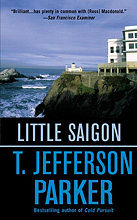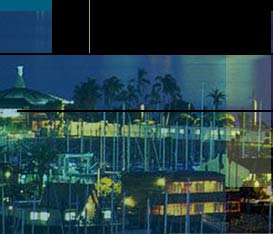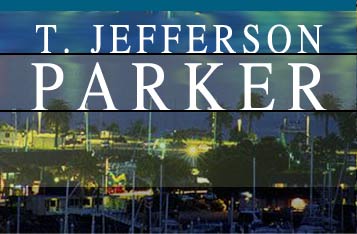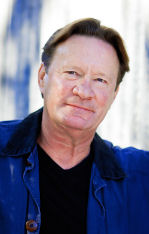
   

 




















|
|
|
 |
| US |
Chuck Frye, former second-best surfer of Laguna Beach, gazed through his windshield and saw no six-foot waves.
Instead, Laguna Canyon Road sped toward him in the darkness, its yellow stripe wavering, eucalyptus trees whisking past the beams of his skewed headlights.
Scenes from the last forty-eight hours played in his mind—fragments of a weekend abandon that was reckless far beyond the limits of common sense. It began as an epic debauch and things went downhill fast. It was exactly what he wanted. The time is nigh, Frye thought, to get myself together.
He sat up straight, took a deep and dizzying breath. How many motoring souls have met their maker on this road? he wondered. In his own lifetime it seemed like a million: busloads of tourists colliding with cement mixers, sports cars slamming into each other head-on, bikers wrapping themselves around power poles while their machines scattered fireworks across the hillsides. And always the orange outlines of the bodies, sprayed by the police to mark the final attitude of the departed.
Frye signaled contritely and made a left turn onto Canyon Oaks Drive.
The old Mercury rumbled past the nursery and body shops, then past the rickety little houses clustered in the darkness. The moon and a distant streetlamp shone on beat-up cars, toolsheds of odd design, drooping clotheslines. A cat ran through three gradients of shadow, then vanished under a pickup. A stand of plantain drooped with malarial laziness, while beside it a wall of honeysuckle gave off an aroma that made everything seem more warmer than it was. Laguna Beach—art colony, tourist trap, a piece of attempted Eden crammed between the hills and the oceans, hippies in the sixties, cocaine in the seventies, AIDS in the eighties, a representative Southern California beach town.
Nimbly executing a hairpin left, Frye gunned the Cyclone up a straightaway so vertical that the sky became a dashboard of whirling needles. Then the stars rushed back into place as he plopped level, narrowly missing the mailbox he had knocked over months ago and that now lay door-up in the ivy in front of his cave-house. He worked himself from the car, wrestled his mail from the box and advanced on his front door. "Home," he mumbled. "Frye one, Visitors zip."
The cave-house stood before him, a dark lump against a dark sky. It was built into a hill overlooking the city, facing west. Fumbling with his keys, Frye marveled again at the frankly weird history of the place—the gist being that one Skippy Sharp had paid a contractor to build a house in the great sandstone outcropping, then had run out of money when the project was only half finished. Skippy had lived in it for a few months before disappearing forever into Mexico, so the contractor himself took it over, then Sharp's mother somehow got control of the thing and rented it in succession to a painter, an architect, a fish breeder, a child-molester, a nurse, then finally to the former second-best surfer in Laguna. Not long after he had rented it, Frye learned that the land had been bought by his own father, the venerable Edison Joseph Frye, thereby adding this tiny piece of ground to the vast Orange County Frye Ranch. Mrs. Sharp still "managed" the property, raising Frye's rent often and with gusto, believing, he concluded that his family fortune warranted such outrage. It was, in fact, a cave-house—with back rooms being nothing more than dark irregular caverns. But the living room, bedroom, kitchen and bath featured walls, electricity, and unimpeded views of the Pacific. Frye's friends said that the cave-house was like Frye himself: half-finished, prone to dark recesses. At any rate, it was home.
He stood in the living room and felt the floor rotating under him, an illusion he explained away as the spinning of the Earth on her axis. He went straight to his answering machine. Frye attended to his gadget with devotion, hopeful that some huge improvement might be in the offing.
Linda called to say she had filed Friday.
Dr. Redken's office called: scan results in.
Bill Antioch at the MegaShop called to tell him about the Masters Invitational Surf Contest at Huntington Beach.
The last message was from Bennett. "Hope you haven't forgotten the birthday thing at Wind. Li wrote a song for us. See you there about ten, little brother. Saigon Days is still going on—that civic party—so I'll save you a seat. That's today, Sunday, in case you forgot."
Frye checked his watch but it was gone. He fumbled for a light switch, knocked over a stack of resumes he'd just had copied, then consulted his MegaShop surf calendar. It was still turned to February because of the whopping Hawaiian wave pictured there, tubular and perfect as Jack Lord's hair. Flipping to August he confirmed that this was Sunday—Bennett's birthday, and, of course, his own.
He gathered up the resumes, wondering if the Register would call him. The Times had turned him down for lack of five years' experience in daily-news reporting. He'd sent a resume and a snappy cover letter to every newspaper in driving distance. He hated writing those letters more than anything on Earth.
Frye called time, made a cup of coffee, dumped in some milk and went outside. Feeling festive on this, his thirty-third birthday, he put down the convertible top and set out for Little Saigon.
* * *
Back out Laguna Canyon Road, up the San Diego Freeway, a warm summer night filled with redolent intervals of strawberries, oranges, asparagus, smog.
Thoughts of Linda—filing Friday—rushed his mind, but Frye countered them with the radio news and images of his weekend bacchanal. His marriage had lasted five years. In the end it had shot downward with a ballistic velocity. He assumed he had asked for it. Linda, he thought, I can't face you now, love.
He pondered his family instead. Bennett Mark Frye, ex-second lieutenant, 3d platoon, C Company, 1st Battalion, 3d Marines. Bennett had made his bones and spilled his blood in Dong Zu, just north of Saigon, suffered the instant havoc of a Bouncing Betty, and returned to the States shortened and decorated. At thirty-eight, he was five years older than Chuck, to the day. Sometimes this shared birthday seemed all they had in common. Bennett, in his full complement, was shortish and thick; Chuck was taller, by far, and lean. Bennett was dark; Chuck light. Bennett was popular, a leader; Chuck was private and often even had trouble leading himself. Bennett was better at just about everything. Their father, Edison, took an almost sociological interest in the differences between his sons, which he included were generational and not genetic. As a decorated World War II hero, Edison believe military discipline had made Bennett what he was today, and that Chuck's lack of any discipline had made him what he was—and wasn't. Then there was Hyla, the peacemaker and source of whatever grace her sons had come to possess.
He got off on Bolsa, made a U-turn, and headed into the city of Westminster. The street signs were done in Old English lettering and the buildings sported hints of the Tudor—a grafting of English hamlet onto Southern California suburb.
Drinking coffee, he sped down Bolsa past the Brothers of Patrick Novitiate, which hovered quietly behind a stand of olive trees; past the Colony Funeral Home and its high stained-glass windows; past the subdivisions and trailer parks, the fast food stands, and auto shops. Everything closed at eight.
Westminster, he thought, just forty miles south of L.A. and fifteen north of Laguna, but a world apart. A suburb straining for identity, thus the Briticisms. The words "bedroom community" might apply, but always made Frye think of one huge mattress shared by people who did nothing but sleep, snack in bed, and mate. When the Indo-Chinese refugees arrived in the late seventies, Westminster got the identity it never had: it became capitol of the largest population of Vietnamese outside of Southeast Asia. The numbers kept changing, as numbers do. Last Frye had heard, there were three hundred thousand Vietnamese in California, and half of them lived in the south. Eighty thousand alone lived in Orange County—most of those lived right here.
Another block down Bolsa, and the suburban landscape suddenly changed. East of the Asian Culture Center, all the signs were in bright Vietnamese. Crenulated tile rooftops with ornate extrados winged off into the darkness. Storefronts and parking lots were cluttered with flyers. The shop windows were alive with hand-scrawled paint: Sieu Thi My-Hoa Supermarket, Thoi Tran Fabrics, Bao Ngoc Jewelry and Gifts, Ba Le Cafe, Tuyet Hong Service Center, Ngan Dinh Sandwich. The warm inland air no longer smelled of citrus, but of cooked fish and frying vegetables and exotic, unidentified spice. Frye breathed it all in. Little Saigon, he thought, and a few years ago hardly a Vietnamese in the state.
He watched the cars bustling in and out of the lots, and the refugees—dark people with dark eyes and black hair and solemn faces—gathered by the storefronts, glancing about as if expecting the worst. The South Vietnamese flag—yellow and red—waved outside a fish market, and beneath it hung a banner proclaiming these to be city of Westminster "Saigon Days." An old man at the corner leaned on his cane and stared at the crosswalk. His wife stared too. A cultural pastime for some, Frye thought: waiting to leave. Three young girls skipped past the couple and weaved through the traffic.
He slowed and passed Washington Street, the first of the next half-dozen streets that—in a county called Orange but having few oranges, in a city called Westminster but having few English, in a place called Little Saigon but as far away from Vietnam as one might get—bear
the names of the first six American presidents.
There seemed to be some lesson for the republic, but what was it?
He made a right at Brookhurst and kept his eye out for the nightclub, tucked in a corner and easy to miss. Then he spotted the neon green and orange with its bent palm tree, glowing against the summer night. ASIAN WIND CABARET—DANCING & DINING. The marquee said: CELEBRATE SAIGON DAYS... LI FRYE IN CONCERT...HAPPY BIRTHDAY BENNETT AND BOTHER. Second billing again, he thought, and they spelled me wrong. Certain individuals would not protest that call. Looks like a sellout too—parking lot buried in cars and a crowd at the door.
Julie, the club owner, was working the ticket window. She looked up, smiled, and waved him in. Frye stuffed his wad of bills back into a pocket: six hundred and thirty-seven dollars, his total lifetime savings to date, not including a business account that had next month's lease payment for the MegaShop.
He stepped through the bead curtains and into the club.
© T. Jefferson Parker

|
 |
 |





